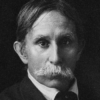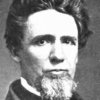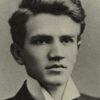Ah, Postumus! they fleet away,
Our years, nor piety one hour
Can win from wrinkles and decay,
And Death’s indomitable power.
[Eheu fugaces, Postume, Postume,
labuntur anni nec pietas moram
rugis et instanti senectae
adferet indomitaeque morti.]Horace (65-8 BC) Roman poet and satirist [Quintus Horacius Flaccus]
Odes [Carmina], Book 2, # 14, l. 1ff (2.14.1-4) (23 BC) [tr. Conington (1872)]
(Source)
"To Postumus." It is unclear which acquaintance of Horace this was addressed to; the name is popularly associated (back to Horace's time) with being given to a child born after the death of their father (which gives it a certain irony here); in reality, it was originally given to the (broader) category of last children of a father.
(Source (Latin)). Alternate translations:
Ah Posthumus! the years of man
Slide on with winged pace, nor can
Vertue reprieve her friend
From wrinkles, age, and end.
[tr. Fanshawe; ed. Brome (1666)]
Time (Posthumus) goes with full sail,
Nor can thy honest heart avail
A furrow'd brow, old age at hand,
Or Death unconquer'd to withstand:
One long night,
Shall hide this light
From all our sight,
And equal Death
Shall few dayes hence,
stop every breath.
[tr. S. W.; ed. Brome (1666)]
The whirling year, Ah Friend! the whirling year Rouls on apace;
And soon shall wrinkles plough thy wither'd Face:
In vain you wast your Pious breath,
No prayers can stay, no vows defer
The swift approach of Age, and conqu'ring Death.
[tr. Creech (1684)]
Alas! my Postumus, my Postumus, the fleeting years glide on; nor will piety cause any delay to wrinkles, and advancing old age, and insuperable death.
[tr. Smart/Buckley (1853)]
Ah, Posthumus, the years, the fleeting years
Still onwards, onwards glide;
Nor mortal virtue may
Time's wrinkling fingers stay,
Nor Age's sure advance, nor Death's all-conquering stride.
[tr. Martin (1864)]
Postumus, Postumus, the years glide by us,
Alas! no piety delays the wrinkles,
Nor old age imminent,
Nor the indomitable hand of Death.
[tr. Bulwer-Lytton (1870)]
Ah! Postumus! Devotion fails
The lapse of gliding years to stay,
With wrinkled age it nought avails
Nor conjures conquering Death away.
[tr. Gladstone (1894)]
Ah me! how quickly, Postumus, Postumus,
Glide by the years! nor even can piety
Delay the wrinkles, and advancing
Age, and attacks of unconquer'd Hades.
[tr. Phelps (1897)]
Alas! Postumus, Postumus, the fleeing years
Slip by, and duteousness does not give pause
To wrinkles, or to hasting age,
Or death unconquerable.
[tr. Garnsey (1907)]
Ah! Postumus, Postumus, fast fly the years,
And prayers to wrinkles and impending age
Bring not delay; nor shalt assuage
Death's stroke with pious tears.
[tr. Marshall (1908)]
Alas, O Postumus, Postumus, the years glide swiftly by, nor will righteousness give pause to wrinkles, to advancing age, or Death invincible.
[tr. Bennett (Loeb) (1912)]
Ah, Postumus, my Postumus, the fleeting years roll by;
Wrinkles and ever nearing eld stay not for piety:
Relentless they, relentless death's unconquered tyranny.
[tr. Mills (1924)]
Ah, how they glide by, Postumus, Postumus,
The years, the swift years! Wrinkles and imminent
Old age and death, whom no one conquers --
Piety cannot delay their onward
March.
[tr. Michie (1963)]
Oh year by year, Póstumay,
Póstumay, time slips by,
And holiness can't stop us drying,
Or hold off death.
[tr. Raffel (1983)]
How the years go by, alas how the years go by.
Behaving well can do nothing at all about it.
Wrinkles will come, old age will come, and death,
Indomitable. Nothing at all will work.
[tr. Ferry (1997)]
Alas! O Postumus, Postumus! Swiftly the years glide by, and no amount of piety will wrinkles delay or halt approaching age or ineluctable death.
[tr. Alexander (1999)]
Oh how the years fly, Postumus, Postumus,
they’re slipping away, virtue brings no respite
from the wrinkles that furrow our brow,
impending old age, Death the invincible.
[tr. Kline (2015)]
Quotations about:
death
Note not all quotations have been tagged, so Search may find additional quotes on this topic.
Death is the liberator of him whom freedom cannot release, the physician of him whom medicine cannot cure, and the comforter of him whom time cannot console.
Charles Caleb "C. C." Colton (1780-1832) English cleric, writer, aphorist
Lacon: Or, Many Things in Few Words, Vol. 2, § 200 (1822)
(Source)
It is so hard for us little human beings to accept this deal that we get. It’s really crazy, isn’t it? We get to live, then we have to die. What we put into every moment is all we have.
There is no Death! What seems so is transition;
This life of mortal breath
Is but a suburb of the life Elysian,
Whose portal we call Death.Henry Wadsworth Longfellow (1807-1882) American poet
“Resignation,” st. 5 (1849), The Seaside and the Fireside (1850)
(Source)
CATO: How beautiful is death, when earn’d by virtue!
Who would not be that youth? What pity is it
That we can die but once to serve our country!Joseph Addison (1672-1719) English essayist, poet, statesman
Cato, Act 4, sc. 4, l. 79ff (1713)
(Source)
On being presented with the corpse of his son. This line is thought to have inspired Nathan Hale.
I can remember how when I was young I believed death to be a phenomenon of the body; now I know it to be merely a function of the mind — and that of the minds who suffer the bereavement. The nihilists say it is the end; the fundamentalists, the beginning; when in reality it is no more than a single tenant or family moving out of a tenement or a town.
GARCIN: I died too soon. I wasn’t allowed time to — to do my deeds.
INEZ: One always dies too soon — or too late. And yet one’s whole life is complete at that moment, with a line drawn neatly under it, ready for the summing up. You are — your life, and nothing else.
Old Age, tho’ despised, is coveted by all Men.
Thomas Fuller (1654-1734) English physician, preacher, aphorist, writer
Gnomologia: Adages and Proverbs (compiler), # 3795 (1732)
(Source)
The planet’s tyrant, dotard Death, had held his gray mirror before them for a moment and shown them the image of things to come.
Dorothy Sayers (1893-1957) English author, translator
The Unpleasantness at the Bellona Club, ch. 2 (1928)
(Source)
With tread imperial, impartial pallid Death
knocks at the doors of cottages and palaces. [Pallida mors æquo pulsat pede pauperum tabernas
Regumque turres.]Horace (65-8 BC) Roman poet and satirist [Quintus Horacius Flaccus]
Odes [Carmina], Book 1, # 4, l. 13ff (1.4.13-14) (23 BC) [tr. Alexander (1999), “To Lucius Sestius”]
(Source)
(Source (Latin)). Alternate translations:
Death knocks as boldly at the Rich mans dore
As at the Cottage of the Poore,
[tr. Fanshaw (1666), "To L. Sextius, a Consular Man"]
With equal foot, Rich friend, impartial Fate
Knocks at the Cottage, and the Palace Gate.
[tr. Creech (1684), "He adviseth his Friend to live merrily"]
Pale Death, impartial, walks his round: he knocks at cottage-gate
And palace-portal.
[tr. Conington (1872)]
Pale death knocks at the cottages of the poor, and the palaces of kings, with an impartial foot.
[tr. Smart/Buckley (1853), "To Sextius"]
Death comes alike to all, — to the monarch's lordly hall,
Or the hovel of the beggar, and his summons none shall stay.
[tr. Martin (1864), "To Sestius"]
But all the while, with equal step, pale Death strides on unpausing,
Knocks at thé lowly shed and regal tower.
[tr. Bulwer-Lytton (1870), "To Lucius Sestius"]
Pale death, with impartial step, knocks at the hut of the poor and the towers of kings.
[E.g. (1893)]
The kingly tower alike
And pauper's hut pale Death will strike.
[tr. Gladstone (1894), "To the Rich Sextius"]
Pale Death with foot impartial knocks at poor men's dwellings.
And tow'rs of monarchs.
[tr. Phelps (1897), "To Sestius"]
Pale death with foot impartial strikes at the huts of paupers and
Kings' towers.
[tr. Garnsey (1907), "To Sestius"]
With equal foot pale Pluto knocks at hovels of the poor,
And at the tyrant's towers
[tr. Marshall (1908), "Spring"]
Pale Death with foot impartial knocks at the poor man’s cottage and at princes’ palaces.
[tr. Bennett (Loeb) (1912), "Spring's Lesson"]
Marching with step impartial, Death's pale Presence raps its call
At doors of rich and poor alike.
[tr. Mills (1924)]
Hold! Pale Death, at the poor man's shack and the pasha's palace kicking
Impartially, announces his arrival.
[tr. Michie (1964)]
Death raps his bony knuckles, bleached,
Indifferent, on any man’s door, a palace or a hut.
[tr. Raffel (1983)]
Revenant white-faced Death is walking not knowing whether
He's going to knock at a rich man's door or a poor man's.
[tr. Ferry (1997)]
Pale death knocks with impartial foot, at the door of the poor man’s cottage,
and at the prince’s gate.
[tr. Kline (2015), "Spring"]
Duty is weightier than a mountain, while death is lighter than a feather.
Meiji (1852-1912) Emperor of Japan (1867-1912) [明治天皇, Meiji-tennō; b. Mutsuhito (睦仁)]
“Imperial Rescript to Soldiers and Sailors [軍人勅諭, Gunjin Chokuyu]” (1882-01-04)
(Source)
The Rescript was the official code of ethics for military personnel, foundational to the Imperial Japanese armed forces and much of Japanese society. Officially issued by the Emperor Meiji, but actually written by oligarchs Inoue Kowashi and Yamagata Aritomo with editing by journalist Fukuchi Gen'ichiro.
Japanese source. More information on the Rescript.
EDIBLE, adj. Good to eat, and wholesome to digest, as a worm to a toad, a toad to a snake, a snake to a pig, a pig to a man, and a man to a worm.
Ambrose Bierce (1842-1914?) American writer and journalist
“Edible,” The Cynic’s Word Book (1906)
(Source)
Included in The Devil's Dictionary (1911). Originally published in the "Devil's Dictionary" column in the San Francisco Wasp (1882-12-23).
It is better to die well than to live ill. […] He who fears death loses the joy of life. Above all else truth triumphs. He conquers who dies because no adversity can hurt the one over whom iniquity holds not sway.
[Melius est bene mori, quam male vivere […] Qui mortem metuit, amittit gaudia vitae; super omnia vincit veritas, vincit, qui occiditur, quia nulla ei nocet adversitas, si nulla ei dominatur iniquitas.]
Jan Hus (c. 1370-1415) Czech priest, theologian, philosopher, Church reformer [John Huss, etc.]
Letter to Christian of Prachaticz (>1413-04) [tr. Schaff (1915)]
(Source)
Written while in exile from Prague. "Truth triumphs" was adopted as a motto by Hussite fighters, and is inscribed (in Czech, "Pravda vítězí") the banner of the President of the Czechia.
(Source (Latin)). Alternate translation:
It is better to die well than to live badly. [...] He that fears death, loses the joys of life. Above all else, truth is conqueror. He conquers, who is slain: for no adversity hurts him if no iniquity hath dominion over him.
[tr. Pope (1904)]
The following translation is often mis-cited to Schaff; an examination of Schaff's book shows the above translation instead. I cannot find an original for this translation.
It is better to die well, than to live wrongly [...] Who is afraid of death loses the joy of life; truth prevails all, prevails who is killed, because no adversity can harm him, who is not dominated by injustice.
When Life is woe,
And Hope is dumb,
The World says, “Go!”
The Grave says, “Come!”
What if thou be saint or sinner,
Crooked gray-beard, straight beginner, —
Empty paunch, or jolly dinner,
When Death thee shall call.
All alike are rich and richer,
King with crown, and cross-legged stitcher,
When the grave hides all.Richard Watson Gilder (1844-1909) American poet and editor
“Drinking Song,” st. 2, Lyrics, and Other Poems (1885)
(Source)
If anything does happen to me, I shall fall with a contented and prepared mind; and, indeed, death cannot be disgraceful to a brave man, nor premature to one of consular rank, nor miserable to a wise man.
[Si quid obtigerit, aequo animo paratoque moriar. nam neque turpis1mors forti viro potest accidere neque immatura consulari nec misera sapienti.]
Marcus Tullius Cicero (106-43 BC) Roman orator, statesman, philosopher
Orationes in Catilinam [Catilinarian Orations], No. 4, § 2, cl. 3 (4.2.3) (63-12-05 BC) [tr. Yonge (1856), 4.3]
(Source)
(Source (Latin)). Alternate translations:
if any thing should fall out amiss, I shall be contented and ready to die: For Death can never come dishonourable to a Valiant Person, nor untimely to him that is Consular, nor unfortunate to a Wise man.
[tr. Wase (1671), 4.3]
If I am doomed to fall a sacrifice in your cause, I am resigned to my fate. To a well-prepared spirit death can never be dishonourable; to a consul never premature; to a wise man it never can be an evil.
[tr. Sydney (1795)]
If anything shall happen to me, I shall die with a mind contented and prepared. For neither can a disgraceful death happen to a brave man, nor an untimely one to a man of consular rank, nor a wretched one to a wise man.
[tr. Mongan (1879), 4.2]
If any (thing) shall have befallen, I shall die with an equal and prepared mind. For neither a base death is able to happen to a brave man, nor an immature (death) to a consular (man), nor a wretched (death) to a wise man.
[tr. Underwood (1885), 4.2]
If any (thing) shall have befallen, I shall die with an equal [a calm] and prepared mind. For neither a base death is able to happen to a brave man, nor an immature (one) to a consular (man), nor a wretched (one) to a wise (man).
[tr. Dewey (1916), 4.2]
Death cannot be dishonorable to the brave man, or premature to him who has held high office, or lamentable to the philosopher.
[Source]
But now in the shadows
It goes to the bourne
Of Orcus remorseless
Whence none may return.[Qui nunc it per iter tenebricosum
Illuc unde negant redire quemquam.]Catullus (c. 84 BC – c. 54 BC) Latin poet [Gaius Valerius Catullus]
Carmina # 3 “Death of the Sparrow,” ll. 11-12 [tr. Wright (1926), st. 4]
(Source)
Referring to the fate of his beloved Lesbia's beloved sparrow.
See also Shakepeare, Hamlet, Art 3, ll. 86-88.
Death,
That undiscover'd country, from whose bourn
No traveler returns.
There is no particular evidence that Shakespeare ever read Catullus, but other ancients (e.g., Seneca) quoted these lines from this Carmina. At the same time, post-Shakespearean translators may have been themselves influenced by the Bard's lines in their translations.
(Source (Latin)). Alternate translations:
Poor bird! who now that darksome bourn
Hast pass'd, whence none can e'er return.
[tr. Nott (1795), ll. 13-14]
He now that gloomy path must trace,
Whence Fate permits return to none.
[tr. Lamb (1821), st. 3]
Now he treads that gloomy track,
Whence none ever may come back.
[tr. T. Martin (1861)]
Now to that dreary bourn
Whence none can e'er return,
Poor little sparrow wings his weary flight.
[tr. Cranstoun (1867)]
Now he wendeth along the mirky pathway,
Whence, they tell us, is hopeless all returning.
[tr. Ellis (1871)]
Now he has gone to that dark place,
Whose dismal pathway none retrace.
[tr. Bliss (1872)]
Now must he wander o'er the darkling way
Thither, whence life-return the Fates denay.
[tr. Burton (1893)]
Now it fares along that path of shadows from where nothing may ever return.
[tr. Smithers (1894)]
Now, hs pretty doings o'er,
His little soul goes darkling whither all
Must go, and, going, may return no more.
[tr. Harman (1897)]
Now he goes along the dark road, thither whence they say no one returns.
[tr. Warre Cornish (1904)]
The wee thing’s gane the shadowy road
That’s never traveled back by ony:
[tr. Davies (1912)]
Now he travels the path of shadows, to that place, whence all men agree there is no return.
[tr. Stuttaford (1912)]
Now does it seek the darksome way,
Whence none return nor message bring.
[tr. Stewart (1915), st. 4]
Now he's journeying through the eternal
Darkness, to the relentless shades.
[tr. Symons-Jeune (1923), st. 4]
And now he journeys whence they say
No steps retrace the darkling way.
[tr. MacNaghten (1925)]
Now he is gone; poor creature,
lost in darkness,
to a sad place
from which no one returns.
[tr. Gregory (1931), st. 3]
Who now? It's hard to walk through tenebrous flume
down there, where it is granted not one comes back.
[tr. Zukofsky (1959)]
It now flits off on its way, goes, gloom-laden
down to where -- word is -- there is no returning.
[tr. C. Martin (1979)]
Who now goes through that gloomy journey
from whence they denied anyone returns.
[tr. Sullivan (1997)]
Now he goes down the shadowy road
from which they say no one returns.
[tr. Kline (2001)]
Now he's traveling on that dark-shroud journey whence, they tell us, none of the departed ever returns.
[tr. Green (2005)]
It now goes through the dark journey
to that place from where they deny that anyone returns.
[tr. Wikibooks (2017)]
He who now goes through the shadowy journey
thither, whence they deny that anyone returns.
[tr. Wikisource (2018)]
The prince who kept the world in awe,
The judge whose dictate fix’d the law;
The rich, the poor, the great, the small,
Are levell’d; Death confounds ’em all.John Gay (1685-1732) English poet and playwright
Fables, Part 2, Fable 16 “The Ravens, the Sexton, and the Earthworm” (1727)
(Source)
Old age isn’t so bad when you consider the alternative.
Maurice Chevalier (1888-1972) French singer, actor, entertainer
(Attributed)
Attributed in James B. Simpson, Contemporary Quotations (1964 ed.) (though not showing up in later editions), citing New York Times (1960-10-09). I could not find the reference in the Times online archives, and Respectfully Quoted: A Dictionary of Quotations (1989) treats it as "Unverified."
Quote Investigator finds evidence Chevalier used the line as of 1959, but finds evidence of anonymous / filler use of it or close variants as early as 1952. He tracks multiple references, including attributions to Chevalier.
Ye Venuses and Cupids mourn,
Ye whom the graces most adorn,
Come, and your tears of sorrow shed:
My Lesbia’s little bird is dead.[Lugete, o Veneres Cupidinesque
et quantum est hominum venustiorum!
passer mortuus est meae puellae,
passer, deliciae meae puellae.]Catullus (c. 84 BC – c. 54 BC) Latin poet [Gaius Valerius Catullus]
Carmina # 3 “Death of the Sparrow,” ll. 1-4 [tr. Bliss (1872)]
(Source)
(Source (Latin)). Alternate translations:
Mourn all ye Loves! ye Graces mourn!
My Lesbia's fav'rite sparrow's gone!
Ye men for wit, for taste, preferr'd,
Lament my girl's departed bird!
[tr. Nott (1795)]
Mourn, all ye loves and graces; mourn,
Ye wits, ye gallant, and ye gay;
Death from my fair her bird has torn,
Her much-loved Sparrow's snatch'd away.
[tr. Lamb (1821)]
Loves and Graces, mourn with me,
Mourn, fair youths, where'er ye be!
Dead my Lesbia's sparrow is,
Sparrow, that was all her bliss.
[tr. T. Martin (1861)]
Ye Graces! mourn, oh mourn!
Mourn, Cupids Venus-born!
And loveliest sons of earth, where'er ye are !
Dead is now my darling's sparrow --
Sparrow of my "winsome marrow,"
Than her very eyes, oh! dearer to her far.
[tr. Cranstoun (1867)]
Weep each heavenly Venus, all the Cupids,
Weep all men that have any grace about ye.
Dead the sparrow, in whom my love delighted,
The dear sparrow, in whom my love delighted.
[tr. Ellis (1871)]
Weep every Venus, and all Cupids wail,
And men whose gentler spirits still prevail.
Dead is the Sparrow of my girl, the joy,
Sparrow, my sweeting's most delicious toy.
[tr. Burton (1893)]
O mourn, you Loves and Cupids, and all men of gracious mind. Dead is the sparrow of my girl, sparrow, darling of my girl.
[tr. Smithers (1894)]
Mourn, all ye Loves, ye Loves and Cupids, mourn,
Make moan for heaviness, ye gallants bright,
For Lesbia's bird, my Lesbia weeps forlorn;
He's dead -- poor, pretty bird -- my love's delight!
[tr. Harman (1897)]
Mourn, ye Graces and Loves, and all you whom the Graces love. My lady's sparrow is dead, the sparrow my lady's pet.
[tr. Warre Cornish (1904)]
Mourn, all ye Graces, mourn, ye Sons of Love, and all whose hearts engender pity. The sparrow of my beloved is no more; that sparrow, the delight of my beloved.
[tr. Stuttaford (1912)]
Weep, weep, ye Loves and Cupids all,
And ilka Man o’ decent feelin’:
My lassie’s lost her wee, wee bird,
And that’s a loss, ye’ll ken, past healin’.
[tr. Davies (1912)]
Let Venus bow her head in grief,
And tears drown Cupid's eyes in sorrow,
And men of feeling everywhere
Forget to smile -- until tomorrow.
My lady's little bird lies dead,
The bird that was my lady's prize.
[tr. Stewart (1915)]
Weep, ye gods of love and pleasure,
Weep, all all ye of finer clay,
Weep, my darling's lost her treasure,
Mourn her sparrow passed away!
[tr. Symons-Jeune (1923)]
Mourn Loves and Graces all, and you
Of men the lovelier chosen few.
The sparrow of my love is dead,
The playmate of my love is sped.
[tr. MacNaghten (1925)]
Dress now in sorrow, O all
you shades of Venus,
and your little cupids weep.
My girl has lost her darling sparrow.
[tr. Gregory (1931)]
Lament, o graces of Venus, and Cupids,
and cry out loud, men beloved by Her graces.
Pass here, it's dead, meant so much to my girl, the
sparrow, the jewel that delighted my girl.
[tr. Zukofsky (1959)]
Mourn, oh Cupids and Venuses,
and whatever there is of rather pleasing men:
the sparrow of my girlfriend has died,
the sparrow, delight of my girl.
[tr. Sullvan (1997)]
Mourn, O you Loves and Cupids
and such of you as love beauty:
my girl’s sparrow is dead,
sparrow, the girl’s delight.
[tr. Kline (2001)]
Mourn, Cupids all, every Venus,
and whatever company still exists of caring people:
Sparrow lies dead, my own true sweegheart's sparrow.
[tr. Green (2005)]
Mourn, Oh Venuses and Cupids
And all men of finer feeling
The sparrow of my girl has died,
the sparrow, my lady's pet.
[tr. Wikibooks (2017)]
Mourn, O Venuses and Cupids
and however many there are of more charming people:
my girl's sparrow is dead --
the sparrow, delight of my girl.
[tr. Wikisource (2018)]
But not only creativeness and enjoyment are meaningful. If there is a meaning in life at all, then there must be a meaning in suffering. Suffering is an ineradicable part of life, even as fate and death. Without suffering and death human life cannot be complete.
Viktor Frankl (1905-1997) German-American psychologist, writer
Man’s Search for Meaning [Trotzdem Ja zum Leben Sagen], Part 1 (1946) [tr. Lasch (1959)]
(Source)
When you take the wires of the cage apart, you do not hurt the bird, but help it. You let it out of its prison. How do vou know that death does not help me when it takes the wires of my cage down? — that it does not release me, and put me into some better place, and better condition of life?
Randolph S. Foster (1820-1903) American Methodist Episcopal bishop, preacher, educator
“Man a Spiritual Being,” Lecture 2, Chautauqua, New York (1878)
(Source)
Collected in his Beyond the Grave: Being Three Lectures Before Chautauqua Assembly in 1878 (1879).
I postpone death by living, by suffering, by error, by risking, by giving, by losing.
On a long enough time line, the survival rate for everyone will drop to zero.
Chuck Palahniuk (b. 1962) American novelist and freelance journalist
Fight Club, ch. 2 (1997)
(Source)
The phrase also shows up later in the book, in ch. 24: "On a long enough time line, everyone's survival rate drops to zero."
In the 1999 movie adaptation (screenplay by Jim Uhls), the Narrator's line is "On a long enough time line the survival rate for everyone drops to zero."
And now you’ll be telling stories
of my coming back
and they won’t be false, and they won’t be true,
but they’ll be real.Mary Oliver (1935-2019) American poet
“The First Time Percy Came Back,” A Thousand Mornings (2012)
(Source)
Distrust, and darkness, of a future state,
Make poor Mankind so fearful of their Fate.
Death, in itself, is nothing; but we fear
To be we know not what, we know not where.
For all you can hold in your cold dead hand
Is what you have given away.Joaquin Miller (1837-1913) American poet [pen name of Cincinnatus Heine (or Hiner) Miller]
“Peter Cooper (Died 1883),” ll. 11-12, In Classic Shades and Other Poems (1890)
(Source)
This phrasing of the sentiment seems to have been made by Miller, but the sentiment itself predates him in various ways. See, for example, Martial, Epigram 5.42 (AD 90): "You keep thus always what you gave."
Edward Gibbon, in his Decline and Fall of the Roman Empire,, ch. 61 (1776), notes the epitaph of 15th Century Earl Edward Courtenay of Devonshire:
What we gave, we have;
What we spent, we had;
What we left, we lost.
Miller was himself quoted by Edwin M. Poteat, President of Furman University, in his poem "What You Have Given Away" (1909). Poteat put the phrase in quotation marks, but is sometimes still given full credit.
Elbert Hubbard may have been borrowing from Miller in his Little Journeys to the Homes of the Great, Vol. 12 "Great Scientists," "Haeckel" (collected in 1916, but published earlier), where he writes:
We keep things by giving them to others. The dead carry in their clenched hands only that which they have given away; and the living carry only the love in their hearts which they have bestowed on others.
Finally, often in the variant form "All we can hold in our cold dead hands is what we have given away," the phrase is today often identified as a Sanskrit proverb. The universality of thought means it may well have an ancient Indian inspiration, but the language may indicate a tie to Miller's poem, as promulgated. The "Sanscrit proverb" appears as such in Hoyt's New Cyclopedia of Practical Quotations (1922), but not in the 1896 edition. This may be taken from a letter to the editor, New York Times (1908-07-25) by Emily Noble, identifying this as the translation of a Sanskrit proverb.
And Man in portions can foresee
His own funereal destiny;
His wretchedness, and his resistance,
And his sad unallied existence:
To which his Spirit may oppose
Itself — and equal to all woes,
And a firm will, and a deep sense,
Which even in torture can decry
Its own concenter’d recompense,
Triumphant where it dares defy,
And making Death a Victory.
One short sleepe past, wee wake eternally,
And death shall be no more; death, thou shalt die.John Donne (1572-1631) English poet
Holy Sonnets, No. 10, “Death Be Not Proud,” ll. 13-14 (1609)
(Source)
To an embalmer there are no good men and bad men. There are only dead men and live men.
H. L. Mencken (1880-1956) American writer and journalist [Henry Lewis Mencken]
A Little Book in C Major, ch. 4, § 15 (1916)
(Source)
This thing of being a hero, about the main thing to it is to know when to die. Prolonged life has ruined more men that it ever made.
When writers die they become books, which is, after all, not too bad an incarnation.
From rest and sleepe, which but thy pictures bee,
Much pleasure, then from thee, much more must flow.John Donne (1572-1631) English poet
Holy Sonnets, No. 10, “Death Be Not Proud,” ll. 5-6 (1609)
(Source)
If life is a play, then old age is its last act — and we ought to leave the theater when we are weary or, even better, when we are satisfied.
[Senectus autem aetatis est peractio tamquam fabulae, cuius defetigationem fugere debemus, praesertim adiuncta satietate.]Marcus Tullius Cicero (106-43 BC) Roman orator, statesman, philosopher
De Senectute [Cato Maior; On Old Age], ch. 23 / sec. 85 (23.85) (44 BC) [tr. Cobbold (2012)]
(Source)
(Source (Latin)). Alternate translations:
The poete whiche rehercith in the Scene in some fable owght to beware that he make not werye and that he noye not his heerers by ouer long rehercyng the fable. So that men owght not desire to lyve ouir olde age seeyng pryncypally that in that age or nevir he is fulle weerye for to lyve.
[tr. Worcester/Worcester/Scrope (1481)]
And old age is, as it were, the peroration or final end of a man's time in this world, much like to the epilogue or catastrophe of an interlude, the wearisome repetition or defatigation whereof we ought to avoid and eschew, and especially when we are fully cloyed with satiety.
[tr. Newton (1569)]
But old age is the last act of our life as of a play, of which there ought to be an end, especially when there is satiety and fulnesse of time joyned with it.
[tr. Austin (1648)]
Good Acts (if long) seem tedious, so is Age
Acting too long upon this Earth her Stage.
[tr. Denham (1669)]
For in Old Age we are as in the last Act of a Play, in which we ought to take our Leave when fully satisfied with the Enjoyment.
[tr. J. D. (1744)]
And as the whole Course of Life but too much resembles a Farce, of which Old-Age is the last Act; when we have enough of it, 'tis most prudent to retire, and not to make a Fatigue of what we should endeavour to make only an Entertainment.
[tr. Logan (1744)]
In fine, old age may be considered as the last scene in the great drama of life, and one would not, surely, wish to lengthen out his part till he sunk down sated with repetition and exhausted with fatigue.
[tr. Melmoth (1773)]
Now old age is the completion of life, as of a play, weariness of which we ought to avoid, especially when satiety is added.
[Cornish Bros. ed. (1847)]
Now old age is the consummation of life, just as of a play; from the fatigue of which we ought to escape, especially when satiety is superadded.
[tr. Edmonds (1874)]
Old age is the closing act of life, as of a drama, and we ought in this to avoid utter weariness, especially if the act has been prolonged beyond its due length.
[tr. Peabody (1884)]
Now, old age is as it were the playing out of the drama, the full fatigue of which we should shun, especially when we also feel that we have had more than enough of it.
[tr. Shuckburgh (1895)]
Age; is; the end; of life, as of a play:
We should avoid the weariness that comes,
The more, if we've enjoyed it to the full.
[tr. Allison (1916)]
Moreover, old age is the final scene, as it were, in life's drama, from which we ought to escape when it grows wearisome and, certainly, when we have had our fill.
[tr. Falconer (1923)]
When life's last act, old age, has become wearisome, when we have had enough, the time has come to go.
[tr. Grant (1960, 1971 ed.)]
Yes, old age is, so to speak, the last scene in the play; when we find it beginning to be tiresome we should beat a hasty retreat from it, especially when we feel as if we had seen all this before, entirely too many times.
[tr. Copley (1967)]
Old age is the last act of the drama of life and when it is over we ought to leave it, especially if we have achieved a good fullness in it.
[tr. Gerberding (2014)]
Old age is but life’s drama’s final curtain.
[tr. Bozzi (2015)]
Old age is the final act in the play of life. When we have had enough and are weary, it is time to go.
[tr. Freeman (2016)]
And though mine arm should conquer twenty worlds,
There’s a lean fellow beats all conquerors.Thomas Dekker (c. 1572-1632) English dramatist and pamphleteer
Old Fortunatus, Act 1, sc. 1, l. 281 (1599)
(Source)
We never understand how little we need in this world until we know the loss of it.
James Barrie (1860-1937) Scottish novelist and dramatist
Margaret Ogilvy, ch. 8 “A Panic in the House” (1896)
(Source)
A biographical work about his mother and family. He identifies this as a favorite saying of hers.
If, as certain small-minded philosophers believe, I shall feel nothing at all after death, then at least I don’t have to worry that they will be there to mock me after they die!
[Sin mortuus, ut quidam minuti philosophi censent, nihil sentiam, non vereor ne hunc errorem meum philosophi mortui irrideant.]Marcus Tullius Cicero (106-43 BC) Roman orator, statesman, philosopher
De Senectute [Cato Maior; On Old Age], ch. 23 / sec. 85 (23.85) (44 BC) [tr. Freeman (2016)]
(Source)
Critiquing the Epicurians, who would disagree with his belief in an immortal soul.
(Source (Latin)). Alternate translations:
For if aftir this presente life I be dede as wele in soule as in body as that some yong and smale philosophers of whiche men name Epycures that affermyn, Certayne it is that I shall feele nothyng. And also I am not afferde that suche philosophers so ded mockyn me nor of this myne oppinion. Aftir whiche I verily beleve that the soules be undedly.
[tr. Worcester/Worcester/Scrope (1481)]
And if it were not so, that after death I should feel nothing nor have any sense at all (as certain perrifoggers and bastard philosophers hold opinino) I fear not a whit least these lip-labourers and ideitical philosophers, when they themselves be dead, should scoff and make a mocking-stock at this mine assertion and belief, because they themselves shall also be without sense, and like to brute beasts.
[tr. Newton (1569)]
But if when I am dead (as some small Philosophers say) I shall feel nothing, I fear not least the dead Philosophers should laugh at this my error.
[tr. Austin (1648)]
If those who this Opinion have despis'd,
And their whole life to pleasure sacrific'd;
Should feel their error, they when undeceiv'd,
Too late will wish, that me they had believ'd.
[tr. Denham (1669)]
But if after this Life I shall no longer be sensible, as some little Philosophers imagine, then am I in no Fear that dead Philosophers will laugh at my mistaken Opinion.
[tr. J. D. (1744)]
And if, when dead, I should (as some minute Philosophers imagine) be deprived of all further Sense, I am safe at least in this, that those Blades themselves will have no Opportunity beyond the Grave to laugh at me for my Opinion.
[tr. Logan (1744)]
I have the satisfaction in the meantime to be assured that if death should utterly extinguish my existence, as some minute philosophers assert, the groundless hope I entertained of an after-life in some better state cannot expose me to the derision of these wonderful sages, when they and I shall be no more.
[tr. Melmoth (1773)]
But if (as certain super-subtle philosophers conclude) I shall feel nothing, I am not afraid lest these philosophers, when dead, should ridicule this error of mine.
[Cornish Bros. ed. (1847)]
But if I, when dead, shall have no consciousness, as some narrow-minded philosophers imagine, I do not fear lest dead philosophers should ridicule this my delusion.
[tr. Edmonds (1874)]
While if in death, as some paltry philosophers think, I shall have no consciousness, the dead philosophers cannot ridicule this delusion of mine.
[tr. Peabody (1884)]
But if when dead, as some insignificant philosophers think, I am to be without sensation, I am not afraid of dead philosophers deriding my errors.
[tr. Shuckburgh (1895)]
But if when dead;
As some philosophers of little note
Believe, I feel no more, there is no fear
These dead philosophers should mock me there.
[tr. Allison (1916)]
But if when dead I am going to be without sensation (as some petty philosophers think), then I have no fear that these seers, when they are dead, will have the laugh on me!
[tr. Falconer (1923)]
True, certain insignificant philosophers hold that I shall feel nothing after death. If so, then at least I need not fear that after their own deaths they will be able to mock my conviction!
[tr. Grant (1960, 1971 ed.)]
If on the other hand, as certain petty philosophers have held, I shall have no sensation when I am dead, then I need have no fear that deceased philosophers will make fun of this delusion of mine.
[tr. Copley (1967)]
Some second-rate philosophers suggest that when I am dead I will be conscious of nothing. But all that means is that, if I’m wrong, they won't be able to make fun of me after their death.
[tr. Cobbold (2012)]
But anyway, if when I die my spirit also dies, I certainly won't give a flip about the opinions of dead philosophers.
[tr. Gerberding (2014)]
If when I am dead I’ll have no sensation,
As some small philosophers think, I won’t fear
Accents of derision from their graves to hear.
[tr. Bozzi (2015)]
Poor fool, what makes you promise yourself a long life, when there is not a day of it that goes by in security? Again and again, people who looked forward to a long life have been caught out over it, called away quite unexpectedly from this bodily existence. Nothing commoner than to be told, in the course of conversation, how such a man was stabbed, such a man was drowned; how one fell from a height and broke his neck, another never rose from table, another never finished his game of dice. Fire and sword, plague and murderous attack, it is always the same thing — death is the common end that awaits us all, and life can pass suddenly, like a shadow when the sun goes in.
[Ha stulte, quid cogitas te diu victurum, cum nullum diem habeas securum? Quam multi decepti sunt et insperati de corpore extracti! Quoties audisti a dicentibus, quia ille gladio cecidit, ille submersus est, ille ab alto ruens cervicem fregit, ille manducando obriguit, ille ludendo finem fecit, alius igne, alius ferro, alius peste, alius latrocinio interiit: et sic omnium finis mors est, et vita hominum tanquam umbra cito pertransit.]Thomas à Kempis (c. 1380-1471) German-Dutch priest, author
The Imitation of Christ [De Imitatione Christi], Book 1, ch. 23, v. 7 (1.23.7) (c. 1418-27) [tr. Knox-Oakley (1959)]
(Source)
(Source (Latin)). Alternate translations:
Thou art a fool, if thou think to live long, sith thou art not sure to live one day to the end. How many have been deceived through trust of long life, and suddenly have been taken out of this world or they had thought. How oft hast thou heard say that such a man was slain, and such a man was drowned, and such a man fell and broke his neck ? This man as he ate his meat was strangled, and this man as he played took his death ; one with fire, another with iron, another with sickness, and some by theft have suddenly perished ! And so the end of all men is death, for the life of man as a shadow suddenly fleeth and passeth away.
[tr. Whitford/Raynal (1530/1871)]
You are foolish if you think to live long, since you are not certain to live one day through to the end. How many have been deceived through trusting in a long life who have suddenly been taken out of the world much sooner than they had thought. How often have you heard that such a man was slain, and such a man was drowned, and such a man fell and broke his neck; this man choked on his food, and this man died in his recreation; one by fire, another by the sword, another by sickness, and some by theft have suddenly perished. And so the end of all men is death, and the life of man is as a shadow which suddenly glides and passes away.
[tr. Whitford/Gardiner (1530/1955)]
Ah foole, why dost thou think to live long, when thou canst not promise to thy selfe one day, how many have been deceived and suddenly snatcht away? How often dost thou hear these reports, such a man is slain, another is drowned, a third breaks his neck with a fall, this man died eating, and that man playing? One perished by fire, another by the sword, another of the plague, and another was slain by theeves, thus death is the end of all, and mans life passeth away like a shadow.
[tr. Page (1639), 1.23.29-31]
Does any Confidence of long Life encourage you to defer putting this good Advice in Execution speedily ? Nay, but reflect, fond Man, how little you can promise your self one poor single Day. How many Instances have you before your Eyes, or fresh in your Remembrance, of Persons miserably deluded and disappointed in this Hope, and hurried out of the Body without any warning at all? How often have you been surprized with the News of this Friend being run thro', another drowning crossing the Water, a Third breaking his Neck by a Fall, a Fourth fallen down dead at Table, or choaked with his Meat, a Fifth seized with an Apoplex at Play, a Sixth burnt in his Bed, a Seventh murthered, an Eighth killed by Thieves, a Ninth struck with Lightning, or Blasting, or Pestilence, a Tenth swallow'd up in an Earthquake. Such vast variety of Deaths surround us, and so fleeting a Shadow is the Life of a Man.
[tr. Stanhope (1696; 1706 ed.)]
Ah foolish man! why dost thou still flatter thyself with the expectation of a long life, when thou canst not be sure of a single day? How many unhappy fools, deluded by this hope, are in some unexpected moment separated from the body! How often dost thou hear, that one is slain, another is drowned, another by falling from a precipice has broken his neck, another is choaked in eating, another has dropt down dead in the exercise of some favorite diversion; and that thousands, indeed, are daily perishing by fire, by sword, by the plague, or by the violence of robbers! Thus is death common to every age; and man suddenly passeth away as a vision of the night.
[tr. Payne (1803), 1.23.8]
Ah! fool, why dost thou think to live long, when thou canst not promise to thyself one day. How many have been deceived and suddenly snatched away! How often dost thou hear these reports, Such a man is slain, another man is drowned, a third breaks his neck with a fall from some high place, this man died eating, and that man playing! One perished by fire, another by the sword, another of the plague, another was slain by thieves. Thus death is the end of all, and man's life suddenly passeth away like a shadow.
[ed. Parker (1841)]
Ah, foolish man! why dost thou think thou wilt live long, when thou canst not count upon a single day? How many souls, deluded by this hope, are, in some unexpected moment, separated from the body! How often dost thou hear, that "one is slain, another is drowned, another, by falling form a precipice, has broken his neck -- another is choaked in eating; another has dropt down dead in the exercise of some favourite diversion; and that thousands, indeed, are daily perishing by fire, by sword, by the plague, or by the violence of robbers! Thus, death is the end of all; and the life of man passeth away suddenly like a shadow.
[tr. Dibdin (1851)]
Ah, fool! why dost thou think to live long, when thou art not sure of one day? How many thinking to live long have been deceived, and snatched unexpectedly away? How often hast thou heard related, that such a one was slain by the sword; another drowned; another, from a height, broke his neck; one died eating, another playing? Some have perished by fire; some by the sword; some by pestilence; and some by robbers. And so death is the end of all; and man's life suddenly passeth away like a shadow.
[ed. Bagster (1860)]
Ah, foolish one! why thinkest thou that thou shalt live long, when thou art not sure of a single day? How many have been deceived, and suddenly have been snatched away from the body! How many times hast thou heard how one was slain by the sword, another was drowned, another falling from on high broke his neck, another died at the table, another whilst at play! One died by fire, another by the sword, another by the pestilence, another by the robber. Thus cometh death to all, and the life of men swiftly passeth away like a shadow.
[tr. Benham (1874)]
Ah! fool, why dost thou think to live long, when thou canst not promise to thyself one day. How many have been deceived and suddenly snatched away! How often dost thou hear these reports, Such a man is slain, another is drowned, a third has broken his neck with a fall, this man died eating, and that man playing! One perished by fire, another by the sword, another by the plague, another was slain by thieves. Thus death is the end of all, and man's life suddenly passeth away like a shadow.
[tr. Anon. (1901)]
Ah, foolish man, why do you plan to live long when you are not sure of living even a day? How many have been deceived and suddenly snatched away! How often have you heard of persons being killed by drownings, by fatal falls from high places, of persons dying at meals, at play, in fires, by the sword, in pestilence, or at the hands of robbers! Death is the end of everyone and the life of man quickly passes away like a shadow.
[tr. Croft/Bolton (1940)]
Ah fool, why think of living long when you have no certainty of a day? How many are mistaken and unexpectedly snatched away from the body. How often you have heard men say, he is killed by the sword, he is drowned, he broke his neck falling from a height, he choked while eating, he met his end while at play; one perished by fire, another from plague, another by a robber; and so death is the end of all; and man’s life passes suddenly like a shadow.
[tr. Daplyn (1952)]
Foolish man, how can you promise yourself a long life, when you are not certain of a single day? How many have deceived themselves in this way, and been snatched unexpectedly from life! You have often heard how this man was slain by the sword; another drowned; how another fell from a high place and broke his neck; how another died at table; how another met his end in play. One perishes by fire, another by the sword, another from disease, another at the hands of robbers. Death is the end of all men; and the life of man passes away suddenly as a shadow.
[tr. Sherley-Price (1952)]
You fool, why do you imagine you will live a long life. when you cannot be sure of a single day? Many have made this mistake and have been snatched away from life when they least expected it. So often you hear people saying that so and so has been killed in battle, and so and so drowned; another man has fallen from a height and broken his neck; one choked over a meal, another met his end in some sport. Others have died by -- fire, by violence, by sickness, by robbery -- death is the end of all, and the life of man passes by and vanishes like a shadow.
[tr. Knott (1962)]
Foolish one, why do you hope for long life when not even one day is certain? How many there are who think they will live long, but are mistaken and snatched from the body unexpectedly. How often have you heard it said: This man fell by the sword; that man was drowned; another fell and broke his neck; yet another was taken while at table and the other was at sport when the end came. One by fire, another by steel, yet another by pestilence and again another by thieves met his death. Death is the end of all men and man’s life is a shadow that quickly passes by.
[tr. Rooney (1979)]
Ah, my foolish friend! why do you think of living a long life when you are not sure of even one day? How many people are tricked and unexpectedly snatched away? How often have you heard it said that someone was murdered, someone else drowned, another broke his neck falling from a high place, yet another choked while eating, and someone else met his end while playing; one person died by fire, another from disease, and another was killed by a robber, and thus death is the end of all, and our life passes suddenly like a shadow.
[tr. Creasy (1989)]
Life, struck sharp on death,
Makes awful lightning.Elizabeth Barrett Browning (1806-1861) English poet
Aurora Leigh, Book 1, ll. 210–211 (1856)
(Source)
We are going to die, and that makes us the lucky ones. Most people are never going to die because they are never going to be born. The potential people who could have been here in my place but who will in fact never see the light of day outnumber the sand grains of Sahara. Certainly those unborn ghosts include greater poets than Keats, scientists greater than Newton. We know this because the set of possible people allowed by our DNA so massively outnumbers the set of actual people. In the teeth of these stupefying odds it is you and I, in our ordinariness, that are here.
Richard Dawkins (b. 1941) English ethologist, evolutionary biologist, author
Unweaving The Rainbow, ch. 1 “The Anaesthetic of Familiarity” (1998)
(Source)
Dawkins has said this passage will be read at his funeral.
Alas for those who never sing,
But die with all their music in them!Oliver Wendell Holmes, Sr. (1809-1894) American poet, essayist, scholar
“The Voiceless” (1858)
(Source)
Life is a disease temporarily relieved every sixteen hours, by sleep. The complete cure: death.
[Vivre est une maladie dont le sommeil nous soulage toutes les seize heures. C’est un palliatif. La Mort est le remède.]
Nicolas Chamfort (1741-1794) French writer, epigrammist (b. Nicolas-Sébastien Roch)
Products of Perfected Civilization [Produits de la Civilisation Perfectionée], Part 1 “Maxims and Thoughts [Maximes et Pensées],” ch. 2, ¶ 113 (1795) [tr. Parmée (2003), ¶ 91]
(Source)
(Source (French)). Alternate translations:
Life is a malady in which sleep soothes us every sixteen hours; it is a palliation; death is the remedy.
[Ballou, comp. (1872)]
Living is a disease from the pains of which sleep eases us every sixteen hours; sleep is but a palliative, death alone is the cure.
[tr. Hutchinson (1902)]
Life is a disease from which sleep gives us alleviation every sixteen hours. Sleep is a palliative, Death is the remedy.
[tr. Mathers (1926)]
Living is an ailment which is relieved every sixteen hours by sleep. A palliative Death is the cure.
[tr. Merwin (1969)]
To live is a malady from which sleep vouchsafes us relief every sixteen hours. That is a palliative. The remedy is death.
[tr. Pearson (1973)]
To live is a sickness that sleep comforts every sixteen hours. It's a palliative. Death is the cure.
[tr. Sinicalchi]
Life is a sickness to which sleep provides relief every sixteen hours. It's a palliative. The remedy is death.
[Source]
All has its date below; the fatal hour
Was register’d in Heav’n ere time began.
We turn to dust, and all our mightiest works
Die too.William Cowper (1731-1800) English poet
The Task, Book 5 “The Winter Morning Walk,” l. 529ff (1785)
(Source)
Today a man is here; tomorrow he is gone. And when he is out of sight, he is soon out of mind.
[Hodie homo est, et cras non comparet. Cum autem sublatus fuerit ab oculis, etiam cito transit a mente.]
Thomas à Kempis (c. 1380-1471) German-Dutch priest, author
The Imitation of Christ [De Imitatione Christi], Book 1, ch. 23, v. 1 (1.23.1) (c. 1418-27) [tr. Sherley-Price (1952)]
(Source)
(Source (Latin)). Alternate translations:
For the common proverb is true: To-day a man , to-morrow none. And when thou art taken out of sight, thou art anon out of mind, and soon shalt thou be forgotten.
[tr. Whitford/Raynal (1530/1871)]
For the common proverb is true: Today a man; tomorrow none. When you are out of sight you are soon out of mind, and soon will be forgotten.
[tr. Whitford/Gardiner (1530/1955)]
To day a man, tomorrow none, and out of sight, out of mind.
[tr. Page (1639)]
To Day the Man is vigorous, and gay, and flourishing, and to Morrow he is cut down, withered and gone. A very little time carries him out of our Sight, and a very little more out of our Remembrance.
[tr. Stanhope (1696; 1706 ed.)]
To-day man is, and to-morrow he is not seen; And when he is once removed from the fight of others, he soon passeth from their remembrance.
[tr. Payne (1803)]
To-day the man is here; to-morrow he hath disappeared. And when he is out of sight, quickly also is he out of mind.
[ed. Parker (1841)]
Man is here to-day, and gone to-morrow: and when once removed from sight, soon perishes from remembrance.
[tr. Dibdin (1851)]
A man is here to-day, and to-morrow he is no longer seen. And when he is taken away from the sight, he is also quickly out of mind.
[ed. Bagster (1860)]
To-day man is, and to-morrow he will be seen no more. And being removed out of sight, quickly also he is out of mind.
[tr. Benham (1874)]
To-day we are here, to-morrow we disappear, and when we are gone, quickly also we are out of mind.
[tr. Anon. (1901)]
Today we live; tomorrow we die and are quickly forgotten.
[tr. Croft/Bolton (1940)]
Today man is; and tomorrow he has vanished. But when he is taken out of sight he also soon passes out of mind.
[tr. Daplyn (1952)]
Here man is today; tomorrow, he is lost to view; and once a man is out of sight, it's not long before he passes out of mind.
[tr. Knox-Oakley (1959)]
A man is here today and gone tomorrow, and once he is out of our sight it is not long before he is out of our minds as well.
[tr. Knott (1962)]
Today a man is and tomorrow he is gone. When he has been removed from our sight he is soon out of mind as well.
[tr. Rooney (1979)]
Today we are, and tomorrow we are gone. And when we are taken out of sight, we soon pass out of mind.
[tr. Creasy (1989)]
All flesh is grass, and all its glory fades
Like the fair flower dishevell’d in the wind;
Riches have wings, and grandeur is a dream;
The man we celebrate must find a tomb,
And we that worship him, ignoble graves.
Do not ask, Reader, how my blood ran cold
and my voice choked up with fear. I cannot write it:
this is a terror that cannot be told.
I did not die, and yet I lost life’s breath:
imagine for yourself what I became,
deprived at once of both my life and death.[Com’io divenni allor gelato e fioco,
nol dimandar, lettor, ch’i’ non lo scrivo,
però ch’ogne parlar sarebbe poco.
Io non mori’ e non rimasi vivo;
pensa oggimai per te, s’ hai fior d’ingegno,
qual io divenni, d’uno e d’altro privo.]Dante Alighieri (1265-1321) Italian poet
The Divine Comedy [Divina Commedia], Book 1 “Inferno,” Canto 34, l. 22ff (34.22-27) (1309) [tr. Ciardi (1954)]
(Source)
Dante the Pilgrim finally sees Satan at the bottom and center of Hell. That would seem to be terrifying enough for this aside to the reader, but various translators and commentators try to cast it as some great theological metaphor.
(Source (Italian)). Alternate translations:
How frozen I was then, and hoarse with cold,
Reader, ask not; for I nought of it write,
As 'twill too little prove, whate'er I say
I did not die, nor yet alive remain'd.
Think for yourself, if you have any sense,
What I then was, depriv'd of Life and Death.
[tr. Rogers (1782)]
While nature thro' my nerves convulsive shook:
New palsies seiz'd my agonizing frame,
And glowing now I felt the fever's flame.
While life and death by turns my limbs forsook.
[tr. Boyd (1802), st. 6]
How frozen and how faint I then became,
Ask me not, reader! for I write it not,
Since words would fail to tell thee of my state.
I was not dead nor living. Think thyself
If quick conception work in thee at all,
How I did feel.
[tr. Cary (1814)]
Ask me not, reader, how both hoarse and cold
I then became; I write it not, nor strive
To tell what never might by speech be told.
There I nor died, nor yet remained alive:
Now think, if thou hast power of thought, and see
What state was mine, that could of both deprive.
[tr. Dayman (1843)]
How icy chill and hoarse I then became, ask not, O Reader! for I write it not, because all speech would fail to tell.
I did not die, and did not remain alive: now think for thyself, if thou hast an grain of ingenuity, what I became, deprived of both death and life.
[tr. Carlyle (1849)]
How freezing then, how feeble I became,
Ask not, thou reader! for I cannot write;
For every language must fall short in flight.
I neither died, nor yet remained alive!
Think within thyself, if ingenious deft,
How I became of strength and heat bereft.
[tr. Bannerman (1850)]
How terror-frozen I became and faint,
Ask not, oh reader, what I cannot write,
For all that I could say would feeble seem.
I did not die, I scarcely was alive;
Hast thou one spark of fancy, think thou then
How I became who knew nor death nor life.
[tr. Johnston (1867)]
How frozen I became and powerless then,
Ask it not, Reader, for I write it not,
Because all language would be insufficient.
I did not die, and I alive remained not;
Think for thyself now, hast thou aught of wit,
What I became, being of both deprived.
[tr. Longfellow (1867)]
How I then became frozen and weak, do not ask, reader, for I do not write it, seeing that every speech would be too little. I did not die and did not remain alive; think now for thyself, if thou hast a grain of wit, what I became, being deprived of one and the other.
[tr. Butler (1885)]
How frozen I became, and weak of grace,
From writing, reader, let me now be shrived,
For every speech were weak such state to trace.
I did not die, and yet no longer lived;
Think for thyself, if thou hast Fancy's bloom,
What I became, of death and life deprived.
[tr. Minchin (1885)]
How I became then chilled and hoarse, ask it not, Reader, for I write it not, because all speech would be little. I did not die, and I did not remain alive. Think now for thyself, if thou hast grain of wit, what I became, deprived of one and the other.
[tr. Norton (1892)]
How frozen I became thereat, how fainting,
Ask it not, reader, for I do not write it.
For all that I could say would be but little.
I did not die, nor yet remained I living.
Bethink thee now, if aught of wit thou claimest,
What I became, bereft of both together.
[tr. Griffith (1908)]
How chilled and faint I turned then, do not ask, reader, for I do not write it, since all words would fail. I did not die and I did not remain alive; think now for thyself, if thou hast any wit, what I became, denied both death and life.
[tr. Sinclair (1939)]
How faint I then became, how frozen cold,
Ask me not, Reader; for I write it not,
Because all speech would fail, whate'er it told.
I died not, yet of life remained no jot.
Think thou then, if of wit thou hast any share,
What I became, deprived of either lot.
[tr. Binyon (1943)]
How cold I grew, how faint with fearfulness,
Ask me not. Reader; I shall nor waste breath
Telling what words are powerless to express;
This was not life, and yet it was not death;
If thou hast wit to think how I might fare
Bereft of both, let fancy aid thy faith.
[tr. Sayers (1949)]
How frozen and faint I then became, ask it not, reader, for I do not write it, because all words would fail. I did not die and I did not remain alive: now think for yourself, if you have any wit, what I became, deprived alike of death and life!
[tr. Singleton (1970)]
How chilled and nerveless. Reader, I felt then;
do not ask me -- I cannot write about it --
there are no words to tell you how I felt.
I did not die -- I was not living either!
Try to imagine, if you can imagine,
me there, deprived of life and death at once.
[tr. Musa (1971)]
O reader, do not ask of me how I
grew faint and frozen then -- I cannot write it:
all words would fall far short of what it was.
I did not die, and I was not alive; v think for yourself, if you have any wit,
what I became, deprived of life and death.
[tr. Mandelbaum (1980)]
How frozen and how faint I then became,
Do not enquire, reader, description is useless,
For any speech would be inadequate.
I did not die, nor yet remain alive:
Think for yourself, if you have a trace
Of intellect, how I was, in that condition.
[tr. Sisson (1981)]
How chilled and faint I was
On hearing that, you must not ask me, reader --
I do not write it, words would not suffice:
I neither died, nor kept alive -- consider
With your own wits what I, alike denuded
Of death and life, became as I heard my leader.
[tr. Pinsky (1994)]
How then I became frozen and feeble, do not ask, reader, for I do not write it, and all speech would be insufficient.
I did not die and I did not remain alive: think now for yourself, if you have wit at all, what I became, deprived of both.
[tr. Durling (1996)]
Reader, do not ask how chilled and hoarse I became, then, since I do not write it, since all words would fail to tell it. I did not die, yet I was not alive. Think, yourself, now, if you have any grain of imagination, what I became, deprived of either state.
[tr. Kline (2002)]
How weak I now became, how faded, dry --
reader, don’t ask, I shall not write it down --
for anything I said would fall far short.
I neither died nor wholly stayed alive.
Just think yourselves, if your minds are in flower,
what I became, bereft of life and death.
[tr. Kirkpatrick (2006)]
Then how faint and frozen I became,
reader, do not ask, for I do not write it,
since any words would fail to be enough.
It was not death, nor could one call it life.
Imagine, if you have the wit,
what I became, deprived of either state.
[tr. Hollander/Hollander (2007)]
Don't ask me, reader, how frozen and faint I felt:
I cannot write it, because no matter what words
I used, or how many, none would be sufficient.
I did not die, I did not remain in that world.
Just ask yourself, if you have a mind to work with,
In what condition I was, not dead, not alive?
[tr. Raffel (2010)]
Reader, don’t ask how chill and faint I turned:
I couldn't write it. All the words would fail.
I didn't die, but couldn't live. I learned
What living death and death-in-life entail.
But you must ponder, if you have the wit,
What I, denied both life and death, became.
[tr. James (2013), l. 28ff]
Dead’s not good, but at least it’s simple.
James S. A. Corey (contemp.) American writer [pen name of Daniel Abraham and Ty Franck]
Cibola Burn, ch. 2 (2014)
(Source)
Death is like thunder in two particulars; we are alarmed at the sound of it; and it is formidable only from that which preceded it.
Charles Caleb "C. C." Colton (1780-1832) English cleric, writer, aphorist
Lacon: Or, Many Things in Few Words, Vol. 2, § 110 (1822)
(Source)
The Lord, the Slave, the Peasant, and the King
Unlike in life, in death the self-same thing.[Mors dominos servis et sceptra ligonibus æquat,
Dissimiles simili conditione trahens.]Walter Colman (1600-1645) English Franciscan friar
“La Danse Machabre or Death’s Duell,” st. 262 (c. 1633)
(Source)
In Hoyt's New Cyclopedia of Practical Quotations (1922), this is translated:
Death levels master and slave, the sceptre and the law,
and makes the unlike like.
Death, to a good man is but passing through a dark entry, out of one little dusky room of his Father’s house, into another that is fair and large, lightsome and glorious, and divinely entertaining.
Isaac Watts (1674-1748) English theologian and hymnodist
Miscellaneous Thoughts in Prose and Verse [Reliquiæ Juveniles], ch. 32 “Earth, Heaven, and Hell” (1734)
(Source)
This phrase is often misattributed to Adam Clarke (1762-1832) (e.g., 1853, 1853, 1876, 1880, 1888) or Samuel Clarke (1727-1769) (e.g., 1827). Finding the primary source confirms Watts' authorship, though it is possible that others used the passage in sermons and writings, and the attribution was misremembered.
“Is it true that your life passes before your eyes before you die?”
YES.
“Ghastly thought, really.” Rincewind shuddered. “Oh, gods, I’ve just had another one. Suppose I am about to die and this is my whole life passing in front of my eyes?”
I THINK PERHAPS YOU DO NOT UNDERSTAND. PEOPLE’S WHOLE LIVES DO PASS IN FRONT OF THEIR EYES BEFORE THEY DIE. THE PROCESS IS CALLED “LIVING.”Terry Pratchett (1948-2015) English author
The Last Continent [Death and Rincewind] (1999)
(Source)
Variants and paraphrases:
It is often said that before you die your life passes before your eyes. It is in fact true. It's called living.
It is said that your life flashes before your eyes just before you die. That is true, it’s called Life.
They never fail who die
In a great cause.George Gordon, Lord Byron (1788-1824) English poet
Marino Faliero, Act 2, sc. 2 [Israel Bertuccio] (1821)
(Source)
To me the honour is sufficient of belonging to the universe — such a great universe, and so grand a scheme of things. Not even Death can rob me of that honour. For nothing can alter the fact that I have lived; I have been I, if for ever so short a time. And when I am dead, the matter which composes my body is indestructible — and eternal, so that come what may to my “Soul,” my dust will always be going on, each separate atom of me playing its separate part — I shall still have some sort of a finger in the pie. When I am dead, you can boil me, burn me, drown me, scatter me — but you cannot destroy me: my little atoms would merely deride such heavy vengeance. Death can do no more than kill you.
W. N. P. Barbellion (1889-1919) English diarist [William Nero Pilate Barbellion, pen name of Bruce Frederick Cummings]
The Journal of a Disappointed Man, 1912-12-22 (1919)
(Source)
You serve the best wine always, my dear sir,
And yet they say your wines are not so good.
They say you are four times a widower.
They say … A drink? I don’t believe I would.[Tu Setina quidem semper vel Massica ponis,
Papyle, sed rumor tam bona vina negat:
Diceris hac factus caelebs quater esse lagona.
Nec puto nec credo, Papyle, nec sitio.]Martial (AD c.39-c.103) Spanish Roman poet, satirist, epigrammatist [Marcus Valerius Martialis]
Epigrams [Epigrammata], Book 4, epigram 69 (4.69) (AD 89) [tr. Cunningham (1971)]
(Source)
(Source (Latin)). Alternate translations:
When I with thee, Cinna, doe die or sup,
Thou still do'st offer me they Gossips cup:
And though it savour well, and be well spiced,
Yet I to taste thereof am not enticed.
Now sith you needs will have me cause alledge,
While I straine curt'sie in that cup to pledge:
One said, thou mad'st that cup so hote of spice,
That it had made thee now a widower twice.
I will not say 'tis so, nor that I thinke it:
But good Sir, pardon me, I cannot drinke it.
[tr. Harington (1618), ep. 101; Book 2, ep. 5]
Pure Massic wine thou does not only drink,
But giv'st thy guests: though some this do not think.
Four wives, 't is said, thy flagon caused to die;
This I believe not, yet not thirst to try.
[tr. Killigrew (1695)]
With the best wines of France you entertain:
Yet that your wine is bad the world complain:
That you have lost four wives by it; but I
Neither believe it, Sir, -- nor am adry.
[tr. Hay (1755)]
Thou Setian and Massic serv'st, Pamphilus, up:
But rumor thy wines has accurst.
A fourth time the wid'wer thou'rt hail'd by the cup:
I neither believe it, nor -- thirst.
[tr. Elphinston (1782)]
You always, it is true, Pamphilus, place Setine wine, or Massic, on table; but rumour says that they are not so pure as they ought to be. You are reported to have been four times made a widower by the aid of your goblet. I do not think this, or believe it, Pamphilus; but I am not thirsty.
[tr. Bohn's Classical (1859)]
On Massic and Setinian fares
The guest that banquets in your hall.
Yet, Papilus, report declares
Them not so wholesome after all.
'Tis said that by that wine-jar you
Four times became a widower. Thus
I neither think, nor hold it true,
Nor am I thirsty, Papilus.
[tr. Webb (1879)]
You indeed put on your table always Setine or Massic, Papilus, but rumour says your wines are not so very good: you are said by means of this brand to have been made a widower four times. I don't think so, or believe it, Papilus, but -- I am not thirsty.
[tr. Ker (1919)]
Setine and Massic at your board abound,
Yet some aver your wine is hardly sound;
’Twas this relieved you of four wives they say;
A libel -- but I will not dine to-day.
[tr. Pott & Wright (1921), "A Doubtful Vintage"]
Your butler prates of Setine and of Massic,
But scandal gives it titles not so classic.
"Four wives it's cost you." Gossip's never true,
But I'm not thirsty -- much obliged to you.
[tr. Francis & Tatum (1924), Ep. 202]
I see you do serve Massic wine
And even glorious Setian.
But rumor has it that they smack
A bit of that Venetian
Mixture that Lucretia served,
That four of your dear wives
On tasting those expensive labels
Promptly lost their lives.
It's all, I'm sure, a lot of talk,
Incredible, I think.
But thank you, no; I've got to go.
Besides, I do not drink.
[tr. Marcellino (1968)]
You serve wine in the very best bottles, Papylus,
but they say the wine is not exactly the best,
they say you've become a widower four times now
thanks to those very bottles.
What a crock!
You know I wouldn't take stock
in a rumor like that, Papylus.
It's just that I'm not thirsty.
[tr. Bovie (1970)]
You always serve Setine or Massic, Papylus, but rumor refuses us such excellent wines. This flask is said to have made you a widower four times over. I don't think so or believe so, Papylus, but -- I'm not thirsty.
[tr. Shackleton Bailey (1993)]
Pappus, they say your wine is not good,
it made you a widower four times.
I don't believe that. You're a civilised man.
Nevertheless, my thirst is suddenly gone.v [tr. Kennelly (2008), "A Civilised Man"]
You always serve such fine wine, Papylus,
but rumor makes us pass it up. They say
this flask has widowed you four times. I don't
believe it -- but my thirst has gone away.
[tr. McLean (2014)]
Death cancels our engagements, but it does not affect the consequences of our acts in life.
Katherine Anne Porter (1890-1980) American journalist, essayist, author, political activist [b. Callie Russell Porter]
Letter draft to Mary Doherty (1932-10-21)
(Source)
In Isabel Bayley, ed., Letters of Katherine Anne Porter, Sec. 2 (1990). Discussing the suicide of her friend, Hart Crane.














































